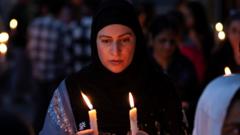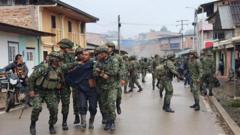The recent assault on Kashmiri traders in Mussoorie has sparked fears among Kashmiris across India, reflecting a troubling trend of rising hostility against them. As security measures escalate in response to violence, many Kashmiris face increased discrimination and a lack of safety, raising concerns about civil liberties and the long-standing impact of political tensions in the region.
Kashmiris Face Rising Hostility Amid Violence in India

Kashmiris Face Rising Hostility Amid Violence in India
Recent violence against Kashmiris in India highlights the growing fears and discrimination faced by the community following a deadly attack in Pahalgam.
In the picturesque hill town of Mussoorie, Uttarakhand, a community of Kashmiri shawl sellers is grappling with new fears following a violent attack attributed to rising tensions in India. Among them is Shabir Ahmad Dar, who has spent over two decades selling pashmina shawls—a staple of Kashmiri craftsmanship and culture. Traditionally regarded as luxury items, these shawls now evoke a painful reminder of the identity that recently became a target for violence.
On a fateful Sunday, Dar and a fellow trader faced harassment and physical assault from a right-wing Hindu group. Their attackers, enraged by a brutal strike in Kashmir that claimed the lives of 26 civilians, wrongfully linked the traders to the violence and demanded they leave town immediately. "They blamed us for the attack, told us to leave town and never show our faces again," Dar recounted, leaving him and others questioning their safety, leading to many Kashmiri vendors fleeing back home out of fear.
The tragic incident underscores a pattern of escalating hostility against Kashmiris, particularly after the Pahalgam attack. Reports have surged of Kashmiri students and vendors being harassed in various Indian cities, with some facing ostracization from classmates and customers. One nursing student returning home described how she and her peers were labeled "terrorists" and forcibly removed from transportation based solely on their Kashmiri identity.
In the wake of the attack, Indian authorities have ramped up security measures in Kashmir, arresting thousands and increasing military presence while demolishing homes of suspected militants—actions critics label as collective punishment. Prominent voices, including former Chief Minister Mehbooba Mufti, have voiced concerns over these heavy-handed tactics, arguing they unjustly target innocent civilians.
This backlash has deeply affected Kashmiris like Shafi Subhan, a shawl seller who previously found solace among customers in Mussoorie. "Mussoorie felt like home… But on that day when our colleagues were attacked, no one came to help," he lamented, expressing a profound emotional pain that transcends the physical violence. Emotional safety remains as elusive as the tangible security now being enforced.
Despite attempts to address civil grievances, with candlelight vigils and protests following the tragedy, the persistent stigma against Kashmiris remains unchallenged. As evident in Mohammad Shafi Dar's plight—a daily wage worker who lost his home to militarized retribution—the community is caught in an unyielding cycle of punishment and suspicion, leaving many wondering about their future in a country that perceives them through a lens of suspicion.
As the search for justice continues in Kashmir, the broader implications of identity and belonging hang heavily in the air, reminding us that civil liberties must not be sacrificed in the name of security. For Kashmiris, the hope for peace now wades through a landscape riddled with uncertainty and fear, leaving a community yearning for solace in the midst of escalating strife.






















